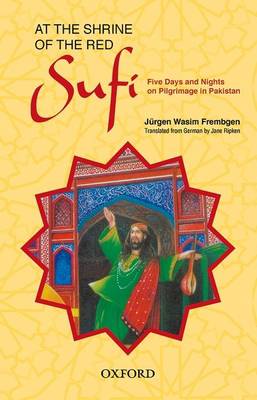
- Afhalen na 1 uur in een winkel met voorraad
- Gratis thuislevering in België vanaf € 30
- Ruim aanbod met 7 miljoen producten
- Afhalen na 1 uur in een winkel met voorraad
- Gratis thuislevering in België vanaf € 30
- Ruim aanbod met 7 miljoen producten
Zoeken
At the Shrine of the Red Sufi
Five Days and Nights on Pilgrimage in Pakistan
Jurgen Wasim Frembgen
Hardcover | Engels
€ 20,95
+ 41 punten
Omschrijving
Refuge for the Taliban, nuclear power, terror camps, sinister secret police and assassinations-this is what everyone, who follows the media, associates Pakistan with. But how different is the country? Munich cultural anthropologist, Jurgen Wasim Frembgen, shows us in one of the most exciting reports we owe to German cultural anthropology in recent decades. Frembgen's visit to the shrine of the Red Sufi Lal Shahbaz Qalandar in the little town of Sehwan in southern Pakistan shows a side of Islam which-translated into its western equivalent would closely resemble the carnival in Rhineland or the anarchic potential of Flower Power. At the same time, the event abounds in superstition, asceticism, and spirituality-the kind which have long since disappeared in the West. At one point, Frembgen describes this annual pilgrimage as Dionysian-but not in the sense of opulent-the poverty, whether chosen or of necessity, is conspicuous everywhere-but in its exuberance and ostensible disorderliness.
Specificaties
Betrokkenen
- Auteur(s):
- Uitgeverij:
Inhoud
- Aantal bladzijden:
- 350
- Taal:
- Engels
Eigenschappen
- Productcode (EAN):
- 9780199063079
- Verschijningsdatum:
- 23/05/2012
- Uitvoering:
- Hardcover
- Formaat:
- Genaaid
- Afmetingen:
- 224 mm x 147 mm
- Gewicht:
- 385 g

Alleen bij Standaard Boekhandel
+ 41 punten op je klantenkaart van Standaard Boekhandel
Beoordelingen
We publiceren alleen reviews die voldoen aan de voorwaarden voor reviews. Bekijk onze voorwaarden voor reviews.











